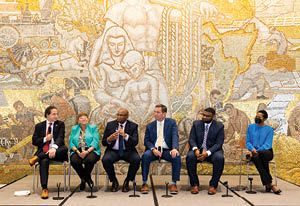NASSP News: December 2022
Tackling the Educator Shortage

In honor of National Principals Month, NASSP teamed up with the National Association of Elementary School Principals and the American Federation of School Administrators to host a panel discussion on the nation’s educator shortage. Held in October at the AFL-CIO headquarters in Washington, D.C., and streamed online (bit.ly/3CUe33L), speakers included four current school leaders: Sue Danielson of Rosa Parks Elementary School in Woodbridge, VA; Robert Motley of Atholton High School in Columbia, MD; Edward Cosentino of Clemens Crossing Elementary School in Columbia, MD; and Samuel Buckley, assistant principal of Pikesville High School in Pikesville, MD, and NASSP Pipeline Ambassador.
Congressman Jamie Raskin (MD-8) also participated, as did Roberto Rodríguez, assistant secretary for planning, evaluation, and policy development at the U.S. Department of Education.
Denisa R. Superville, an assistant editor at Education Week, moderated the discussion. She opened the conversation by asking the school leaders how they, their students, and teachers are doing.
“Our principals are doing better,” said Motley. “During the pandemic it was tough for us … making sure our students and staff were taken care of. As we turn to a sense of normalcy, things are getting better. Homecoming will be indoors instead of out on a football field. But we’re still struggling [with] getting back to that normalcy.”
One of the drivers of the educator shortage according to “NASSP’s Survey of America’s School Leaders and High School Students” (survey.nassp.org/2022) is the stress that comes with the profession. When Superville asked if any of the panelists’ districts have implemented efforts to support school leaders’ mental health, she was met with silence. “Therein lies the problem,” Motley eventually said. “And that’s where our advocacy and voice need to come in.”
As for diversifying the profession, Buckley offered one solution: partnering with Historically Black Colleges and Universities (HBCUs). “We have to incentivize and glamorize education,” said Buckley, who noted that he has partnered with HBCUs at every school—both rural and urban—where he has worked as a school leader. “It has to be cool to be a teacher.”
Join educators across the nation and visit actnow.io/rNP4uWZ to urge your members of Congress to support key initiatives. This will ensure our educator pipeline best meets the needs of our kids and those who serve them.
